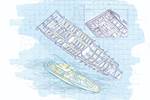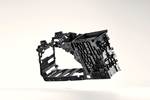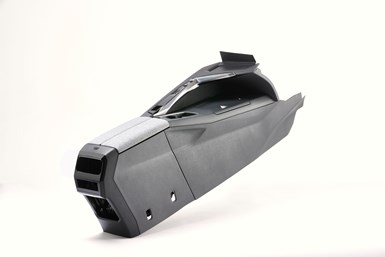Borealis fiberglass PP with 65% PCR applied in landmark automotive project
Together with Plastivaloire and Stellantis, the new Peugeot 3008’s center console structure is being produced with Borealis’ Borcycle M GD3600SY material grade.
Peugeot 3008 outfitted with the Borealis center console. Source | Stellantis (main image) and Borealis (console)
Plastics manufacturer Borealis (Vienna, Austria) introduced Borcycle GD3600SY, a glass fiber-reinforced polypropylene (PP) compound with 65% post-consumer recycled (PCR) polymer content, in Q4 2023. Now, it will first be used in automotive interiors in a landmark project delivered in partnership with Plastivaloire (Langeais, France), a thermoplastic injection specialist and Tier 1 automotive supplier, as well as Stellantis (Hoofddorp, Netherlands), an OEM and the owner of 14 automotive brands.
Borcycle GD3600SY is part of the Borcycle M portfolio of mechanically recycled polyolefins for demanding applications. It contains 30% glass fibers, meaning that almost the entire polymer fraction of the product is made from post-consumer recycled PP. It will initially be used in center console carriers for the Peugeot 3008 vehicle, reportedly marking the first instance of a compound with 65% PCR PP being used in series production for large automotive interior applications.
This development proactively addresses the expected requirements of the forthcoming European End-of-Life Vehicles regulation, according to the company. This stipulates that 25% of the plastic used in new vehicles must come from recycled sources, with a clear focus on mechanical and PCR. Given that polypropylene accounts for about one-third of the plastic in cars, Borealis says that compounds like Borcycle GD3600SY will play a critical role in achieving these circularity goals.
Historically, mechanically recycled plastics from post-consumer waste streams have been of low and inconsistent quality, making them unsuitable for demanding automotive applications. However, advanced recycling technologies like Borcycle M have sought to overcome these limitations: By combining sorting, cleaning and extrusion steps, it converts household waste streams into high-quality PCR polymers.
Borealis and its partners have been recognized as finalists in the category “Automotive, Electrical & Electronic Product” in the Plastic Recycling Awards Europe 2024 for the center console carrier.
For more than 50 years, Borealis has supplied polyolefin solutions for the mobility industry. Its EverMinds commitment to accelerating action on circularity is said to be evident through its circular portfolios, which help reduce the carbon footprint of vehicles without compromising performance. This includes the Bornewables, based on renewable feedstock; Borcycle M, derived from mechanically recycled materials; and Borcycle C, based on chemically recycled feedstock. The circular content in the Bornewables and Borcycle C materials is attributed using a mass balance approach, which is ISCC PLUS certified. This certification guarantees traceability throughout the supply chain.
For related content read “Borealis Borcycle material grades enhance sustainability opportunities for automotive.”
Related Content
-
Composites end markets: Automotive (2024)
Recent trends in automotive composites include new materials and developments for battery electric vehicles, hydrogen fuel cell technologies, and recycled and bio-based materials.
-
Recycling hydrogen tanks to produce automotive structural components
Voith Composites and partners develop recycling solutions for hydrogen storage tanks and manufacturing methods to produce automotive parts from the recycled materials.
-
Co-molding SMC with braided glass fiber demonstrates truck bed potential
Prepreg co-molding compound by IDI Composites International and A&P Technology enables new geometries and levels of strength and resiliency for automotive, mobility.












.jpg;maxWidth=300;quality=90)




